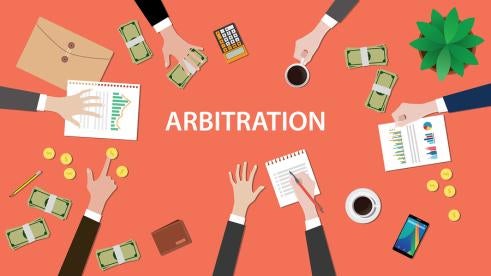First national bank of pennsylvania arbitration agreement
Legal Analysis. Expertly Written. Quickly Found.
Trending News
HB Ad Slot
HB Mobile Ad Slot


Email
412-355-6767
Email
412-355-8220
HB Ad Slot
An Overview Of Pennsylvania’s New Arbitration Law
Friday, August 16, 2019

Related Practices & Jurisdictions
- ADR Arbitration Mediation
- Construction Law
Effective July 1, 2019, Pennsylvania has joined 20 other states in adopting the Revised Uniform Arbitration Act (RUAA) as the most current law governing agreements to arbitrate in Pennsylvania. The RUAA was originally promulgated by the Uniform Law Commission in 2000, which replaced the original Uniform Arbitration Act (UAA) enacted by the Commission in 1956. Recognizing the need to replace an outdated UAA, Pennsylvania adopted the RUAA as a more thorough and robust arbitration law to meet the needs of modern disputes. Now, the RUAA provides specific guidance on various aspects of arbitration, including but not limited to the initiation of arbitration proceedings, impartiality of arbitrators, arbitrator immunity, discovery proceedings, and sanctions.
- Mandatory Application and Optional Retroactivity. The RUAA applies to all agreements to arbitrate signed after July 1, 2019 but permits parties who have executed agreements before that date to voluntarily agree to follow the RUAA’s provisions. For arbitration agreements executed prior to July 1, 2019, for which the parties do not elect to be governed by the RUAA, the UAA will continue to apply.
- Initiation of Arbitration. The RUAA establishes procedures for the initiation of arbitration. Notice must be given in writing or by an electronic record describing the nature of the controversy and the remedy sought. Notice must be given to all parties to the arbitration agreement, not just to the party against which a claim is filed. A court may vacate an arbitration award for failure to give proper notice of the initiation of arbitration.
- Arbitrator’s Duty to Disclose. Prior to accepting the appointment and after making a reasonable inquiry, the RUAA requires that an arbitrator discloses to all parties and to other appointed arbitrators any known fact that a reasonable person would consider likely to affect impartiality. Such required disclosures include personal or financial interests in the outcome of a proceeding and any existing or past relationship with parties, their counsel or representatives, witnesses, and other appointed arbitrators. Likewise, after accepting an appointment, arbitrators have a continuing duty to disclose facts to the same extent as required prior to acceptance. If an arbitrator makes a required disclosure, a timely objection to the arbitrator’s service may provide grounds to vacate an arbitration award for evidence of impartiality. If an arbitrator fails to disclose a required fact, a court may later vacate any award.
- Immunity for Arbitrator. The RUAA makes clear that those serving as an arbitrator are now afforded the same level of immunity as a judge acting in a judicial capacity. This immunity applies even if an arbitrator fails to make a required disclosure regarding facts that may affect their impartiality.
- Discovery. The RUAA provides arbitrators with broad discovery powers, allowing discovery “as appropriate in the circumstances, taking into consideration the needs of the parties to the arbitration proceeding and other affected parties and the desirability of making the proceeding fair, expeditious and cost-effective.” In this regard, the RUAA allows arbitrators to permit discovery from non-parties, decide conditions under which depositions are taken, issue protective orders, and take action against a party noncompliant with a discovery order to the same extent a court can.
- Punitive Damages and Sanctions. The RUAA allows an arbitrator to order any remedies the arbitrator considers appropriate under the circumstances, including punitive damages and attorneys’ fees if such awards are authorized by law in civil proceedings. However, if the arbitrator awards punitive damages, the arbitrator must specify in the award the basis in both law and fact for authorizing the award.
- Waiver. The RUAA enables parties to waive or modify many of its provisions. The statute specifically itemizes those sections that may not be waived or modified by a party to an arbitration agreement or proceeding. All other provisions are waivable. For example, the parties can agree (1) that the arbitrator, not the court, will decide whether a case is subject to arbitration, (2) to restrict or enlarge discovery proceedings, and (3) to modify the type of available remedies.
Overall, the RUAA should provide clarity with respect to most aspects of an arbitration proceeding. Moreover, because arbitration provisions are found in most construction contracts and arbitration often results when mediation ends in an impasse, it is vital that parties and their counsel maintain a familiarity with the procedural and substantive aspects of this alternative dispute resolution process.
Copyright 2024 K & L Gates
Current Public Notices
Published: 10 September, 2024
Published: 4 September, 2024
Published: 30 August, 2024
Published: 30 August, 2024
Published: 28 August, 2024
Published: 27 August, 2024
HB Ad Slot
HB Mobile Ad Slot
Current Legal Analysis
HB Ad Slot
HB Mobile Ad Slot
More from K&L Gates
Upcoming Legal Education Events




HB Ad Slot
HB Mobile Ad Slot
We collaborate with the world's leading lawyers to deliver news tailored for you. Sign Up to receive our free e-Newsbulletins
Legal Disclaimer
You are responsible for reading, understanding, and agreeing to the National Law Review's (NLR’s) and the National Law Forum LLC's Terms of Use and Privacy Policy before using the National Law Review website. The National Law Review is a free-to-use, no-log-in database of legal and business articles. The content and links on www.NatLawReview.com are intended for general information purposes only. Any legal analysis, legislative updates, or other content and links should not be construed as legal or professional advice or a substitute for such advice. No attorney-client or confidential relationship is formed by the transmission of information between you and the National Law Review website or any of the law firms, attorneys, or other professionals or organizations who include content on the National Law Review website. If you require legal or professional advice, kindly contact an attorney or other suitable professional advisor.
Some states have laws and ethical rules regarding solicitation and advertisement practices by attorneys and/or other professionals. The National Law Review is not a law firm nor is www.NatLawReview.com intended to be a referral service for attorneys and/or other professionals. The NLR does not wish, nor does it intend, to solicit the business of anyone or to refer anyone to an attorney or other professional. NLR does not answer legal questions nor will we refer you to an attorney or other professional if you request such information from us.
Under certain state laws, the following statements may be required on this website and we have included them in order to be in full compliance with these rules. The choice of a lawyer or other professional is an important decision and should not be based solely upon advertisements. Attorney Advertising Notice: Prior results do not guarantee a similar outcome. Statement in compliance with Texas Rules of Professional Conduct. Unless otherwise noted, attorneys are not certified by the Texas Board of Legal Specialization, nor can NLR attest to the accuracy of any notation of Legal Specialization or other Professional Credentials.
The National Law Review - National Law Forum LLC 2070 Green Bay Rd., Suite 178, Highland Park, IL 60035 Telephone (708) 357-3317 or toll-free (877) 357-3317. If you would like to contact us via email please click here.
Copyright ©2024 National Law Forum, LLC

![]()

![]()
![]()
![]()
![]()